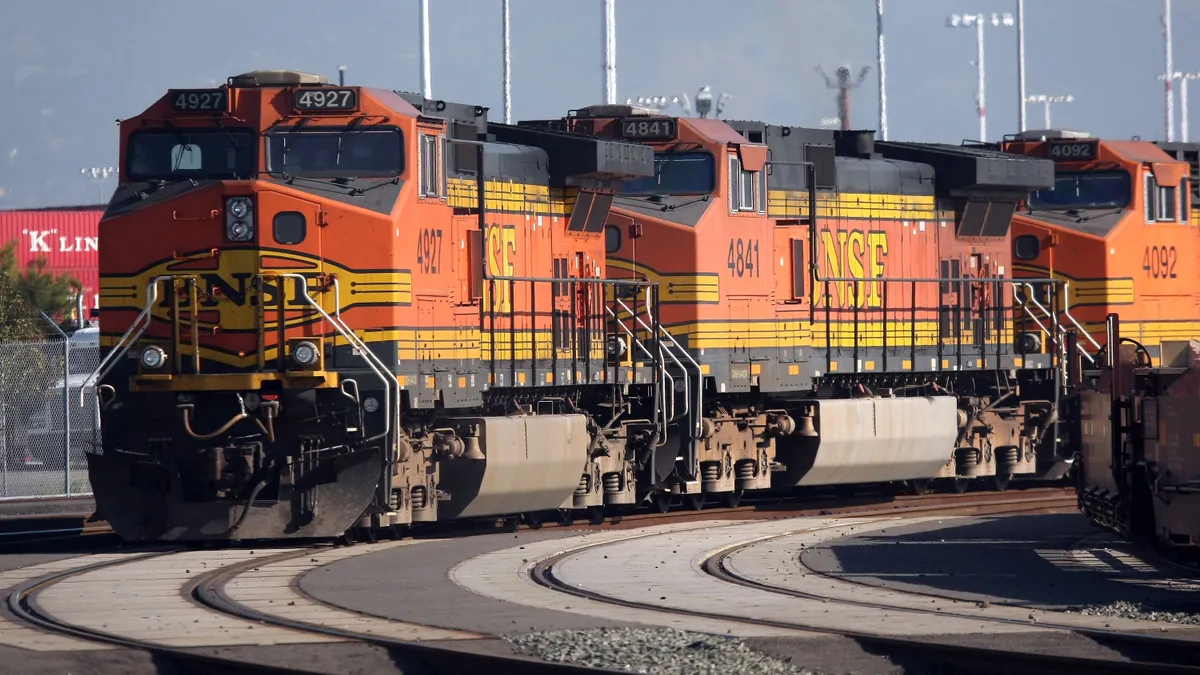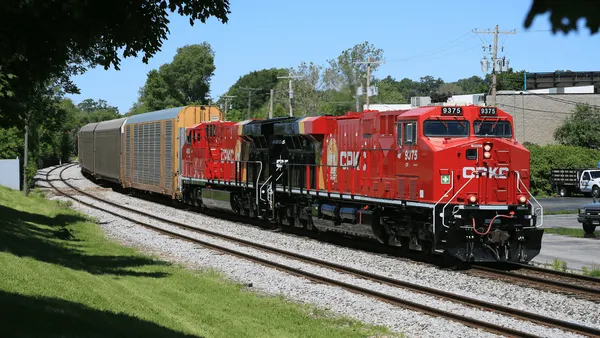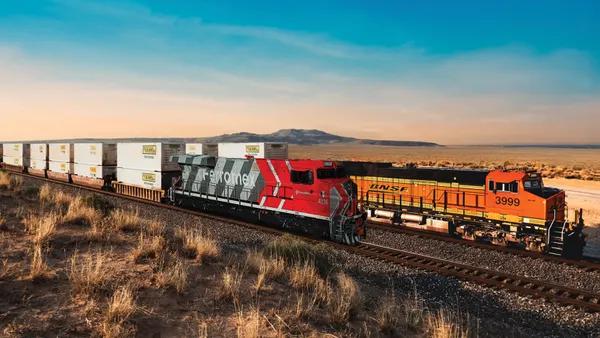Dive Brief:
- BNSF is metering traffic between the West Coast and Chicago this week as it attempts to deal with congestion at its midwestern gateway, according to a notice from the ocean carrier MSC and a confirmation from the railroad. MSC said the metering took effect Sunday and would last for two weeks.
- The notice from MSC said the move "will impact the delivery of on-board or discharged cargoes to Chicago, as cargo will be held at marine terminals until the restriction is abated." But a spokesperson for BNSF did not provide details when asked to quantify the effects of "metering" in terms of the amount of cargo that would be affected.
- "The rate of containers tendered to us on the West Coast continues to exceed the rate of out-gates from Logistics Park Chicago," a BNSF spokesperson said in an email Thursday. "We are confident in our ability to process and unload volume at the rate that we are seeing demand on the West Coast, provided that there is adequate capacity to receive and out-gate that volume at destination."
Dive Insight:
BNSF is the second railroad to take steps to limit its rail traffic to Chicago this week. Union Pacific paused traffic to its Global IV gateway in Chicago for a week on Sunday to dig out of the congestion at the inland terminal.
The U.S. rail network has been roiled by high volume for months at this point, which has led to stakeholders writing the Surface Transportation Board about the impact and the agency calling for input on the situation from the rail carriers.
In April, the Greater Memphis Chamber wrote to the STB about congestion issues in Tennessee.
"Severe congestion and inaccessibility to equipment is inhibiting the timely and cost effective movement of goods," the GMC wrote. "The result is severe, on-going congestion and inaccessibility to equipment."
BNSF said on Thursday it was seeing a low level of out-gate traffic, specifically on weekends. But it underscored that its move to meter traffic is different than the decision by Union Pacific to completely shut down service to Chicago for a week.
BNSF CEO Katie Farmer told the STB in a letter that its "intermodal facilities have been heavily impacted by historically high container dwell and chassis shortages that are driven by extended over-the-road drive time and customer unloading times that have been as much as 48 hours longer than normal."
One of the issues that railroads have been dealing with at their inland terminals is access to chassis. Farmer specifically noted that this is a resource that they don't have any control over.
In a letter to the STB last month, The Fertilizer Institute outlined rail issues it was witnessing across multiple states. In Illinois, the association noted that congestion in Chicago has resulted in railroads routing "to non-typical locations."
"Railroads have been working 24/7 to restore service, clear containers out of the ports and get goods to customers across North America," a spokesperson for the Association of American Railroads said in an email. "Railroads, truckers and the ports are committed to working together until this situation is resolved."
When asked about Union Pacific's decision to shut down service to Chicago experts said earlier this week they understood the decision to take steps to improve congestion in Chicago. But Larry Gross, founder and president of Gross Transportation Consulting, said it is likely to make port congestion worse at The Port of Los Angeles.
Analysts have asked about the potential impact of the Union Pacific decision on earnings calls with Kansas City Southern and J.B. Hunt over the last week.
"Given our interdependence with other carriers and obviously, elevated in cross-border traffic, when other railroads have difficulty on their network, we feel it," Kansas City Southern President and CEO Pat Ottensmeyer said Friday.
When asked about Union Pacific's decision on Monday, J.B. Hunt Intermodal President Darren Field said they don't work with Union Pacific, but are working with BNSF to improve velocity and overall fluidity in the rail system.
"Certainly, if they can be focused on eliminating some of the congestion from international in order to free up capacity for domestic, we would certainly stand to have some benefit from that," Field said.














